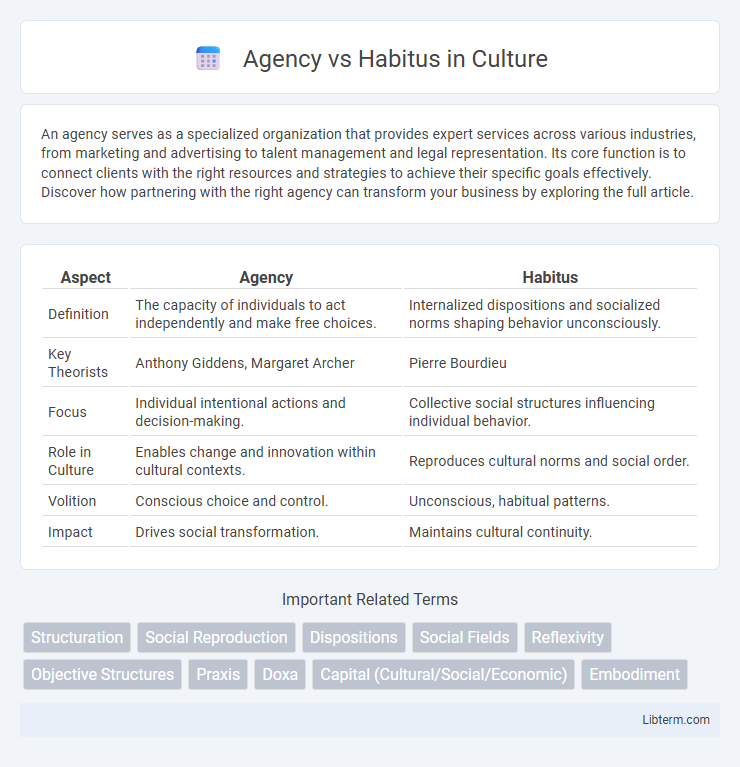An agency serves as a specialized organization that provides expert services across various industries, from marketing and advertising to talent management and legal representation. Its core function is to connect clients with the right resources and strategies to achieve their specific goals effectively. Discover how partnering with the right agency can transform your business by exploring the full article.
Table of Comparison
| Aspect | Agency | Habitus |
|---|---|---|
| Definition | The capacity of individuals to act independently and make free choices. | Internalized dispositions and socialized norms shaping behavior unconsciously. |
| Key Theorists | Anthony Giddens, Margaret Archer | Pierre Bourdieu |
| Focus | Individual intentional actions and decision-making. | Collective social structures influencing individual behavior. |
| Role in Culture | Enables change and innovation within cultural contexts. | Reproduces cultural norms and social order. |
| Volition | Conscious choice and control. | Unconscious, habitual patterns. |
| Impact | Drives social transformation. | Maintains cultural continuity. |
Defining Agency: Power of Individual Action
Agency refers to the capacity of individuals to make choices and exert control over their actions, shaping their social reality despite structural constraints. It highlights the power of personal decision-making in influencing outcomes, emphasizing autonomy and intentionality in human behavior. Understanding agency is crucial for analyzing how individuals navigate and sometimes challenge societal norms and institutions.
Understanding Habitus: Societal Structures at Play
Habitus, a concept developed by sociologist Pierre Bourdieu, represents the deeply ingrained habits, skills, and dispositions shaped by societal structures and individual experiences. It operates beneath conscious awareness, guiding behaviors and perceptions in alignment with social norms and class conditions. By influencing choices and actions, habitus mediates the dynamic relationship between agency and structural constraints within society.
Historical Roots of the Agency vs Habitus Debate
The debate between agency and habitus originates from sociological theory, notably from Pierre Bourdieu's work in the 1970s, which sought to bridge the gap between individual free will and social structures. Agency emphasizes individuals' capacity to act independently and make choices, while habitus refers to the ingrained habits, dispositions, and socialized norms shaped by historical and cultural contexts. This theoretical tension stems from classical sociology, with roots in the works of Emile Durkheim on social facts and Max Weber on individual meanings and rational action.
Key Theorists: Bourdieu and Beyond
Pierre Bourdieu's theory of habitus explains how social structures are internalized through dispositions shaping individual behaviors, while agency highlights personal capacity to act independently of these structures. Bourdieu bridges this by introducing the concept of practical sense, where habitus influences but does not fully determine actions, allowing for variation and change within social fields. Contemporary theorists extend Bourdieu's framework by emphasizing dynamic interactions between agency and habitus, exploring how individuals negotiate constraints and possibilities in diverse social contexts.
Agency in Sociological Theory
Agency in sociological theory refers to the capacity of individuals to act independently and make free choices, shaping their social realities despite structural constraints. It emphasizes human intentionality, reflexivity, and the ability to influence social and cultural systems through decisions and actions. The concept highlights individuals as active agents rather than passive subjects shaped solely by social structures like habitus.
Habitus and Its Influence on Behavior
Habitus, a concept developed by Pierre Bourdieu, refers to the deeply ingrained habits, skills, and dispositions shaped by an individual's social context and experiences, influencing behavior subconsciously. It operates as a system of lasting, transposable dispositions that guide perceptions, thoughts, and actions in routine practices, reflecting the internalization of external social structures. This automatic influence on behavior demonstrates how social structures persist through individual practices without overt awareness, highlighting the interplay between individual agency and societal norms.
Interplay Between Agency and Habitus
The interplay between agency and habitus reveals how individual actions are both constrained and enabled by internalized social structures and dispositions. Agency allows individuals to navigate, reinterpret, and sometimes transform these ingrained habits through conscious decision-making within social contexts. This dynamic interaction shapes behavior and social practices, reflecting a continuous negotiation between personal freedom and structural influences.
Real-World Examples Illustrating the Dynamic
Agency manifests when individuals actively make choices that challenge societal norms, such as entrepreneurs disrupting traditional markets with innovative business models. Habitus shapes behavior unconsciously, as seen in how cultural practices influence preferences and actions, like culinary habits passed down through generations within families. The dynamic interplay between agency and habitus is evident in social movements where activists use ingrained cultural understandings to effectively mobilize communities for change.
Critiques and Limitations of the Agency-Habitus Framework
The agency-habitus framework faces critiques for its tendency to oversimplify complex social dynamics by rigidly separating individual autonomy from ingrained dispositions, potentially underestimating the fluidity of social contexts. Critics argue that the model lacks precision in accounting for rapid social change and the interplay between power structures and individual actions. Limitations include its difficulty in capturing the nuanced ways agents negotiate, resist, or redefine their habitus within evolving cultural and institutional environments.
Implications for Social Change and Policy
Agency emphasizes individual capacity to enact change, while habitus reflects ingrained social structures shaping behaviors and perceptions. Understanding this dynamic highlights that effective social change requires policies addressing both personal empowerment and transformation of underlying social conditions. Integrating agency and habitus in policy design promotes sustainable change by fostering adaptive environments that reshape normative patterns and expand individual opportunities.
Agency Infographic

 libterm.com
libterm.com